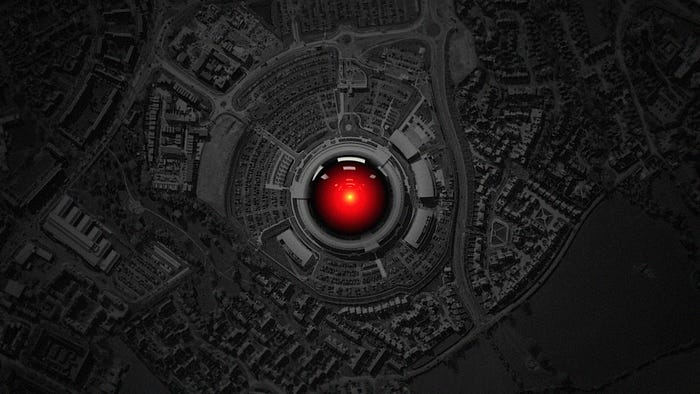All Watched Over by Machines of Loving Grace. A digital god for a digital culture.
Update: I go deeper into this topic in my 2016 Resonate talk https://medium.com/artists-and-machine-intelligence/a-digital-god-for-a-digital-culture-resonate-2016-15ea413432d1#.h2cy5wpvo

“The more tremendous the divinity is represented, the more tame and submissive do men become to his ministers; and the more unaccountable the measures of acceptance required by him, the more necessary does it become to abandon our natural reason, and yield to their ghostly guidance and direction.”
- David Hume, The Natural History of Religion
The great philosopher David Hume believed that our own weaknesses and vulnerabilities gave rise to our belief in ‘invisible, intelligent powers’, and further guided their evolution from ancient ‘vulgar’ polytheistic idolatry to the dominant monotheistic religions of today. Karl Marx saw religion as ‘the opiate of the people’, that numbed our pain, and gave us moments of relief, in the harsh soullessness of reality. Friedrich Nietzsche believed we invented Gods as a means of justifying our evil intent. Geneticist Dean Hamer goes as far as speculating that our affinity for religious belief is linked to a specific ‘God Gene’ in our DNA.
Philosopher and cognitive scientist Daniel Dennett looks at the evolution of religion through the lens of ‘memetic’ Darwinian evolution — a term coined by Richard Dawkins to describe a cultural unit of inheritance analogous to a ‘gene’. He suggests, similar to wild species of plants or animals, ‘wild ideas and beliefs’ are born naturally ‘in the wild’. These wild ideas adapt, they evolve traits, to co-exist with the society they’re in. Some traits help ideas spread — those ideas and traits survive. Other traits cause ideas to die and become obsolete. Those ideas with traits most suited to the requirements of the local culture are eventually assimilated, domesticated and ‘farmed’ — mass reproduced — by stewards, guardians of those ideas. In a feedback loop, as both society and beliefs develop, they symbiotically co-evolve.
There are no universally accepted theories on the emergence of deities or religions. However, there are strong correlations between various characteristics of societies — their modes’ of subsistence, social structures, ethical frameworks — and the nature of their deities and belief systems. E.g. Land-owner based agricultural societies which require non-egalitarian structure tend to have more wrathful, moral deities, while foragers and subsistence farmers are less likely to have such ‘High Gods’. [Peoples, H. C., & Marlowe, F. W. (2012). Subsistence and the evolution of religion. Human Nature, 23(3), 253–269. http://www.ncbi.nlm.nih.gov/pubmed/22837060; https://twitter.com/memotv/status/563325791040466945]

For millennia, religions have evolved, responding to their host culture’s traits and needs. Millions of deities have come and gone. Some have disappeared completely, some are localized to small groups, and others have grown to dominate countries and continents. As societies grow and change, so do their deities and religions along with them. Those beliefs and values which are most culturally fit survive.
And we are now living in times of increasing technological surveillance. In this post-Snowden era, we are more aware of the extent of this invasion of privacy than ever before. But did the Snowden Revelations have the impact we might have hoped for? Did they provoke a public outcry from the masses? A unanimous demand for privacy? Not quite. The people are apathetic — perhaps even sympathetic, finding safety and comfort in knowing that a Higher Force is watching; protecting those who are virtuous and law-abiding. Those who are innocent have nothing to fear. Those who do wrong will be found and punished.
To be very clear — with the word ‘God’, what I’m referring to is not literally a supernatural being that created and/or governs the universe. I’m referring to the role that the concept of God — and religion — has traditionally played, in holding societies together (often at some significant cost to others) and providing ethical frameworks, security, discipline, power, purpose, meaning, ritual, direction, truth, sacrifice, and salvation.
Man invented God to inflict fear, control and power. It was ancient religions that imposed omnipotent, omniscient and omnipresent powers watching over us, judging us, protecting us. Those were myths fabricated to control the masses. Today, as we are losing our spiritual sensibilities and drowning ourselves in a break-neck race of materialism and technological submission, our Overseer too is adapting, and co-evolving. As its metaphysical traits crumble and become obsolete, the gaps are filled and substituted with new traits — physical, material, digital traits — to match our physical, material, digital lifestyles. We don’t fear the Old Gods anymore, they cannot protect or control us, so we need new ones. We have killed God, as Nietzsche says. But we are rebuilding Him, with Technology, to match our techno-culture. The myth is becoming real. We’re edging closer and closer to an authentic man-made deity — living up in The Cloud, of all places. Watching over us, listening to our thoughts and dreams in ones and zeros.
We are creating, A Digital God for our Digital culture.
Title “All watched over by machines of loving grace” from Richard Brautigan’s 1967 Poem and Adam Curtis’s 2011 BBC documentary series.
